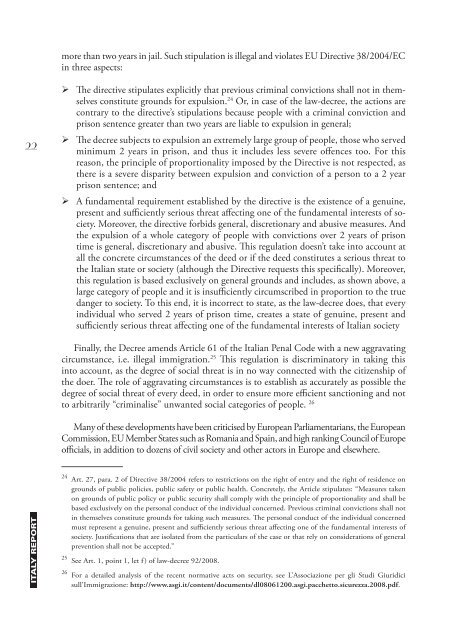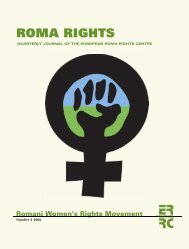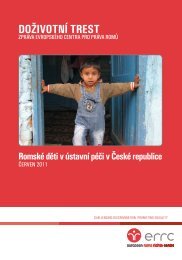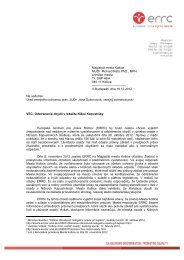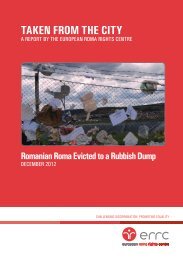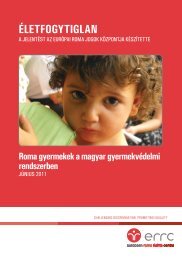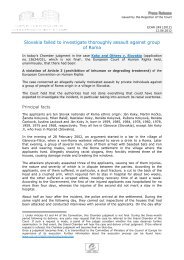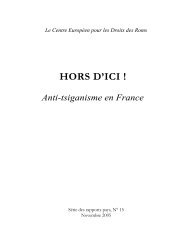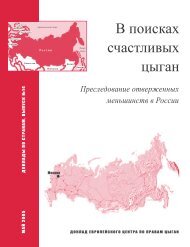security a la italiana sicurezza all'italiana securitate a la italiana
security a la italiana sicurezza all'italiana securitate a la italiana
security a la italiana sicurezza all'italiana securitate a la italiana
You also want an ePaper? Increase the reach of your titles
YUMPU automatically turns print PDFs into web optimized ePapers that Google loves.
22<br />
ITALY REPORT<br />
more than two years in jail. Such stipu<strong>la</strong>tion is illegal and vio<strong>la</strong>tes EU Directive 38/2004/EC<br />
in three aspects:<br />
Ø e directive stipu<strong>la</strong>tes explicitly that previous criminal convictions shall not in themselves<br />
constitute grounds for expulsion. 24 Or, in case of the <strong>la</strong>w-decree, the actions are<br />
contrary to the directive’s stipu<strong>la</strong>tions because people with a criminal conviction and<br />
prison sentence greater than two years are liable to expulsion in general;<br />
Ø e decree subjects to expulsion an extremely <strong>la</strong>rge group of people, those who served<br />
minimum 2 years in prison, and thus it includes less severe offences too. For this<br />
reason, the principle of proportionality imposed by the Directive is not respected, as<br />
there is a severe disparity between expulsion and conviction of a person to a 2 year<br />
prison sentence; and<br />
Ø A fundamental requirement established by the directive is the existence of a genuine,<br />
present and sufficiently serious threat affecting one of the fundamental interests of society.<br />
Moreover, the directive forbids general, discretionary and abusive measures. And<br />
the expulsion of a whole category of people with convictions over 2 years of prison<br />
time is general, discretionary and abusive. is regu<strong>la</strong>tion doesn’t take into account at<br />
all the concrete circumstances of the deed or if the deed constitutes a serious threat to<br />
the Italian state or society (although the Directive requests this specifically). Moreover,<br />
this regu<strong>la</strong>tion is based exclusively on general grounds and includes, as shown above, a<br />
<strong>la</strong>rge category of people and it is insufficiently circumscribed in proportion to the true<br />
danger to society. To this end, it is incorrect to state, as the <strong>la</strong>w-decree does, that every<br />
individual who served 2 years of prison time, creates a state of genuine, present and<br />
sufficiently serious threat affecting one of the fundamental interests of Italian society<br />
Finally, the Decree amends Article 61 of the Italian Penal Code with a new aggravating<br />
circumstance, i.e. illegal immigration. 25 is regu<strong>la</strong>tion is discriminatory in taking this<br />
into account, as the degree of social threat is in no way connected with the citizenship of<br />
the doer. e role of aggravating circumstances is to establish as accurately as possible the<br />
degree of social threat of every deed, in order to ensure more efficient sanctioning and not<br />
to arbitrarily “criminalise” unwanted social categories of people. 26<br />
Many of these developments have been criticised by European Parliamentarians, the European<br />
Commission, EU Member States such as Romania and Spain, and high ranking Council of Europe<br />
officials, in addition to dozens of civil society and other actors in Europe and elsewhere.<br />
24 Art. 27, para. 2 of Directive 38/2004 refers to restrictions on the right of entry and the right of residence on<br />
grounds of public policies, public safety or public health. Concretely, the Article stipu<strong>la</strong>tes: “Measures taken<br />
on grounds of public policy or public <strong>security</strong> shall comply with the principle of proportionality and shall be<br />
based exclusively on the personal conduct of the individual concerned. Previous criminal convictions shall not<br />
in themselves constitute grounds for taking such measures. e personal conduct of the individual concerned<br />
must represent a genuine, present and sufficiently serious threat affecting one of the fundamental interests of<br />
society. Justifications that are iso<strong>la</strong>ted from the particu<strong>la</strong>rs of the case or that rely on considerations of general<br />
prevention shall not be accepted.”<br />
25 See Art. 1, point 1, let f) of <strong>la</strong>w-decree 92/2008.<br />
26 For a detailed analysis of the recent normative acts on <strong>security</strong>, see L’Associazione per gli Studi Giuridici<br />
sull’Immigrazione: http://www.asgi.it/content/documents/dl08061200.asgi.pacchetto.<strong>sicurezza</strong>.2008.pdf.


